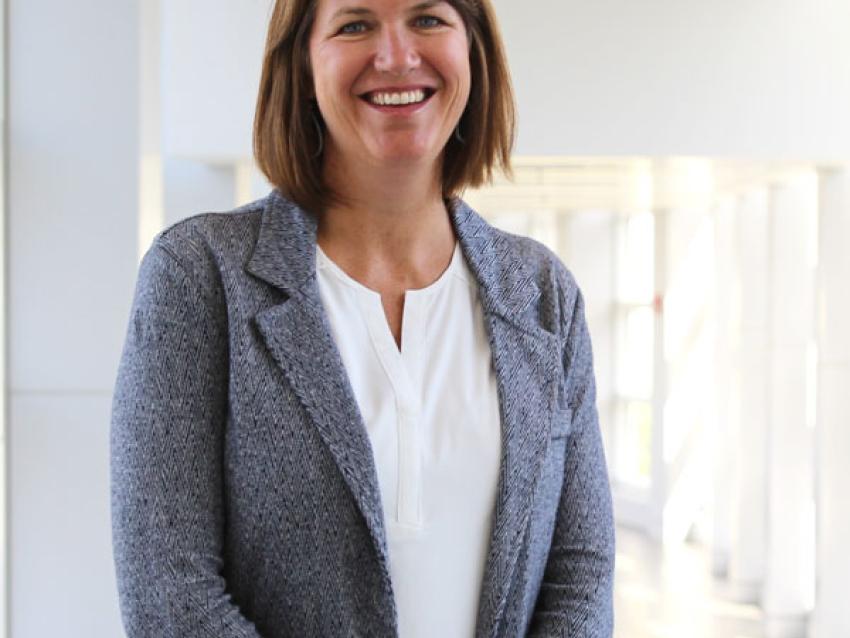
PhD Student, Instructor Brings "Upstream" Thinking to Students Through International Education
Most nursing students expect to learn in a classroom, simulation lab or clinical setting. What they don’t always expect is to gain interprofessional nursing experiences through international educational opportunities.
Here at the University of Kentucky, students gain these transformative skills through the guidance from a public health nursing professional and College of Nursing instructor Hartley Feld, MSN, RN, a Robert Wood Johnson Foundation Future of Nursing Scholar and PhD student in the College.
“I think my job as an instructor in public and community health is about relating the student’s current clinical experience largely from the hospital to the community setting and framing it in a way that focuses on primary and secondary prevention, health promotion and policies to improve the overall health of humanity,” Feld says.
Feld, an instructor for the Interprofessional Global Health course, leads health brigades every spring through Shoulder to Shoulder (STS) Global. The brigades allow groups of students from across campus to travel to Santo Domingo, Ecuador and work with community partners to improve the health and well-being of impoverished and underserved communities. Brigades take place four times a year in March, May, June and Aug., each focusing on different aspects of public health. About 20 students from the College participate in STS brigades every year.
Pictured above: Feld in top row, third from the right, with students and faculty from the College of Nursing and other health colleges from the University of Kentucky.
“STS is a perfect way to facilitate teamwork by working alongside native Ecuadorians to carefully consider their health disparities and to meet their needs,” says two-time STS alum and May 2016 graduate Claire Douthitt, RN, BSN, who now works in the Medical Intensive Care Unit (ICU) for UK HealthCare. “It also gives nursing students the chance to work with more experienced nurses, doctors and other health professionals who have the same passion for outreach.”
Public health nursing was not always at the top of Feld’s to-do list. She attended Loyola University in Chicago, Ill. where she received her undergraduate degree in art history. She then worked for AmeriCorps VISTA, a program based in the U.S. that fights poverty, where she worked in Oregon with migrant farmworkers and their families. She wanted to improve her Spanish and gain a deeper understanding of why people migrate to the U.S., so she travelled to Guatemala for six months.
Once in Guatemala, Feld studied Spanish, taught art lessons at a school and worked on a community garden and a reforestation project. She also shadowed a community health worker – an experience that marked the beginning of her career in public health nursing. One year later, Feld again graduated from Loyola – this time with BSN, RN following her name.
“Becoming a nurse has played a powerful role in my life, in terms of finding meaning, connection and my voice,” she says.
Feld certainly found her voice throughout the past six years that she’s instructed the Interprofessional Global Health course. However, she continues to struggle with the ethical tension of assuring that the STS experience is mutually beneficial for both the community in Ecuador and the students.
Student evaluations and other literature support that it is a valuable experience for the students’ future nursing practice. “But it is a challenge to measure our impact in the community in Ecuador as so many other factors can influence the health of its members,” says Feld. “UK students and faculty are in Ecuador for a short time to supplement care with its partnering clinic, but the STS model allows for the clinic to be sustainable year round.”
Part of the local and global student experience, she says, is to examine the deeper context of health – often an uncomfortable subject when examining inequities related to race, education, socioeconomics, their environment and sexual orientation.
“These can all play a huge role in health and why people get sick, so we need to understand and acknowledge this in order to promote wellness, create better health care systems, prevent illness and costly hospitalizations.” Feld says. “With brigades, we need to look at power dynamics, equity in health and primary and secondary prevention, meaning catching the sickness before it happens.”
That kind of thinking, Feld says, is termed “upstream" thinking.
She uses a common public health metaphor that places people at the end of a river, near drowning or mysteriously sick. To accommodate these people, a hospital is built and nurses are trained to treat their illnesses. But nurses are also trained to examine what happened before the people ended up in the water – or before their patients get sick. This is public health nursing.
“We examine what community and population level factors placed them at risk to end up there in the first place,” says Feld. “Why were they pushed? Was it intentional? Were there structural issues? These can be uncomfortable questions to ask, as most of nursing education is focused on simply taking care of those who are sick.”
Feld’s difficult questions impacted her student, Douthitt (pictured on the far right), among many others.
“Learning from Hartley Feld was the highlight of my experience with STS,” says Douthitt. “She is always willing to sacrifice her time to help others, whether they be students, patients or members of the global community. She was the first nurse I knew who made me think ‘this is the kind of nurse I want to be when I grow up.’”
Feld is currently pursuing her PhD, examining pre-conception decision making with a focus on “upstream” factors that influence unplanned pregnancies in both Ecuador and the U.S. Upon graduation in May 2018, Feld will continue to teach, research and expand global health opportunities for her students. Her ultimate dream is to work for the Bill and Melinda Gates foundation, working toward the United Nations Sustainable Development goals of improving health globally.
